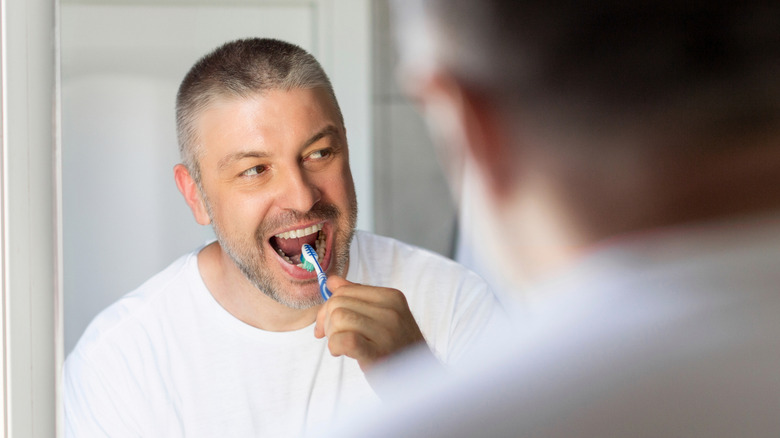When You Turn 50, This Is What Happens To Your Teeth
When you're younger, it's easy to get away with little things, like skipping a warm-up before a workout or having that extra drink at happy hour. But as you get older, those habits tend to catch up with you. No, your life doesn't take a downward spiral once you hit 50, but health issues do become more of a concern with age.
Take your teeth and overall dental health. Maybe you've always gotten a clean bill of health at the dentist, but as your body experiences more wear and tear, your mouth's defenses can weaken, too. For example, as you get older, your body may produce less saliva, a problem that can be compounded by dry mouth from certain medications or health conditions such as diabetes, according to MedlinePlus. Saliva plays a key role in protecting your teeth from damaging acids. Without enough of it, you're more likely to experience dry mouth, which allows bacteria to build up and raises your risk for tooth decay. And reduced saliva isn't the only dental change that comes with aging.
Teeth issues that increase with age
If you love how white your teeth look after whitening treatments, be careful. Overusing (or incorrectly using) whitening products can actually damage your enamel (per Dentistry of West Bend). On top of that, enamel naturally becomes thinner and more brittle with age, making teeth more prone to cracking and sensitivity, according to a 2023 article in Aging and Disease. As enamel wears down, more of the yellow-colored dentin underneath is exposed, which can make your teeth look less bright.
Inside each tooth is a soft core that contains nerves, blood vessels, and stem cells that help with repair. As you age, this core shrinks, reducing blood flow and sensitivity, while also making it harder for teeth to recover from infection.
Gums change with age, too. When you're younger, gum recession might show up from brushing your teeth too hard, but later in life, gums often recede simply from aging, which exposes tooth roots. Bone density decreases as well — including the bones that support your teeth — which can increase the risk of tooth loss and gum disease. Gum disease can also stem from shifts in your oral microbiome over time. Your oral microbiome is also linked to broader health issues like heart disease, diabetes, Alzheimer's, and even certain cancers.
Stay ahead of teeth issues before you turn 50
You don't have to wait until you're 50 to start protecting your teeth from the effects of aging. One of the best defenses is sticking to the basics, such as brushing twice a day with a fluoride toothpaste. Fluoride not only helps prevent bacteria from sticking to your teeth but also strengthens and repairs enamel, according to the National Institute of Dental and Craniofacial Research. Don't forget to clean dental implants, bridges, and dentures regularly, and make flossing once a day part of your routine to clear away debris between teeth.
(Find out how often you should see your dentist.)
It's also important to pay attention to changes in your mouth. Oral cancer risk increases with age, so let your dentist know if you notice any soreness, lumps, or patches in your mouth or jaw that last longer than two weeks (per Office of Disease Prevention and Health Promotion). If you struggle with dry mouth from medications or health conditions, your dentist can suggest ways to ease symptoms and lower your risk of infection. Finally, lifestyle choices make a big difference. Cutting back on sugary foods and alcohol can reduce your risk of tooth decay and oral cancer, while avoiding smoking lowers your chances of both gum disease and oral cancer.


